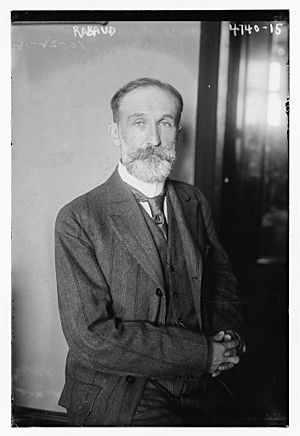Henri Rabaud facts for kids
Henri Benjamin Rabaud (born November 10, 1873 – died September 11, 1949) was a French conductor, composer, and teacher. He held important positions in French music. He was known for supporting traditional music styles in the early 1900s.
Contents
Life and Career of Henri Rabaud
Henri Rabaud grew up in a family of musicians. His father, Hippolyte Rabaud, was a cellist and a professor at the famous Paris Conservatoire. Henri's mother was a singer. She almost performed the main female role in the opera Faust by Charles Gounod. His grandfather was a well-known flutist, and his great-aunt was a famous singer named Julie Dorus-Gras.
Education and Early Career
Henri Rabaud studied music at the Paris Conservatoire. His teachers included André Gedalge and the famous composer Jules Massenet.
In 1908, Rabaud became a conductor at the Paris Opéra-Comique. He later conducted the 100th performance of his own opera, Mârouf, savetier du Caire. From 1914 to 1918, he directed the Paris Opéra.
Working in Boston
In 1918, Henri Rabaud moved to the United States. He became the musical director of the Boston Symphony Orchestra. He stayed there for only one season before returning to Paris. While in Boston, he joined a national music fraternity called Phi Mu Alpha Sinfonia.
Leading the Paris Conservatoire
After Gabriel Fauré retired in 1922, Rabaud took over as the director of the Paris Conservatoire. He held this important role until he retired in 1941. During his time as director, many talented students studied there. These included famous composers like Olivier Messiaen, Jean Langlais, and Jehan Alain. The teaching staff also included well-known musicians such as Paul Dukas and Jean Roger-Ducasse for composition, Marcel Dupré for organ, and Marcel Moyse for flute.
Henri Rabaud's Compositions
Henri Rabaud wrote many different types of music. His cantata Daphné won a major award called the Premier Grand Prix de Rome in 1894. A cantata is a piece of music for singers and instruments.
Operas and Film Music
One of his most famous works is the opéra comique Mârouf, savetier du Caire. An opéra comique is a type of opera with spoken dialogue. This opera mixes styles from Wagner with exotic sounds. He wrote other operas too, like L'appel de la mer. This opera was based on a play called Riders to the Sea by John Millington Synge.
Rabaud also wrote incidental music for plays. Incidental music is played during a play to set the mood. He also composed film scores, which are the music for movies. For example, he wrote the music for the 1925 silent film Joueur d'échecs (Chess Player).
Orchestral and Chamber Music
His orchestral music includes a Divertissement based on Russian songs. He also wrote a piece called Eglogue, which is a poem for orchestra. His best-known orchestral work is the symphonic poem La procession nocturne. A symphonic poem is a piece of orchestral music that tells a story or describes a scene. This piece is still sometimes performed and recorded today. He also wrote music for choir and orchestra, and two symphonies.
Rabaud also composed chamber music. Chamber music is written for a small group of instruments. He wrote several pieces for cello and piano. He also wrote a Solo de concours for clarinet and piano. This was a challenging piece written in 1901 for music competitions at the Conservatoire.
Henri Rabaud was known for his traditional views on music. He famously said, "modernism is the enemy." This shows he preferred older, established styles of music.
Selected List of Works
Stage Works
- La Fille de Roland. Opera (1904)
- Mârouf, savetier du Caire Op. 14. Opera (1914)
- L'Appel de la mer. Opera (1924), based on Riders to the Sea by John Millington Synge
- Rolande et le mauvais garçon. Opera in 5 acts (1934)
Voice with Orchestra
- Job Op. 9. Oratorio (1900)
Orchestral Works
- Divertissement sur des chansons russes Op. 2 (1899)
- Procession nocturne. Symphonic poem Op. 6 (1899)
- Eglogue. Poème virgilien Op. 7 (1899)
- Orchestration of Fauré's Dolly Suite (1906)
- Prélude et Toccata for piano and orchestra
- Symphony No. 1 in D minor Op. 1 (1893)
- Symphony No. 2 in E minor Op. 5 (1899)
Chamber Music
- String Quartet Op. 3 (1898)
- Andante et Scherzo for flute, violin and piano Op. 8 (1899)
- Solo de Concours pour Clarinet et Piano Op. 10 (1901)
Other Works
- Incidental music for 'The Merchant of Venice' (1917)
- Film scores for Le Miracle des Loups (1924) and Joueur d'échecs (1926)
See also
 In Spanish: Henri Rabaud para niños
In Spanish: Henri Rabaud para niños
- Le Miracle des loups (1924 film)


